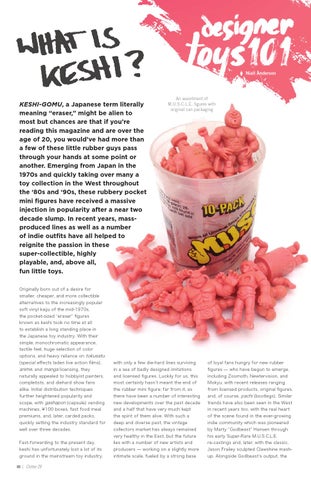Niall Anderson
KESHI-GOMU, a Japanese term literally meaning “eraser,” might be alien to most but chances are that if you’re reading this magazine and are over the age of 20, you would’ve had more than a few of these little rubber guys pass through your hands at some point or another. Emerging from Japan in the 1970s and quickly taking over many a toy collection in the West throughout the ‘80s and ‘90s, these rubbery pocket mini figures have received a massive injection in popularity after a near two decade slump. In recent years, massproduced lines as well as a number of indie outfits have all helped to reignite the passion in these super-collectible, highly playable, and, above all, fun little toys.
An assortment of M.U.S.C.L.E. figures with original can packaging
Originally born out of a desire for
smaller, cheaper, and more collectible
alternatives to the increasingly popular soft vinyl kaiju of the mid-1970s, the pocket-sized “eraser” figures
known as keshi took no time at all
to establish a long standing place in
the Japanese toy industry. With their simple, monochromatic appearance, tactile feel, huge selection of color
options, and heavy reliance on tokusatu (special effects laden live action films),
anime, and manga licensing, they naturally appealed to hobbyist painters, completists, and diehard show fans alike. Initial distribution techniques further heightened popularity and scope, with gashapon (capsule) vending machines, ¥100 boxes, fast food meal premiums, and, later, carded packs, quickly setting the industry standard for well over three decades. Fast-forwarding to the present day,
keshi has unfortunately lost a lot of its
ground in the mainstream toy industry, 46 | Clutter 28
with only a few die-hard lines surviving
of loyal fans hungry for new rubber
and licensed figures. Luckily for us, this
including Zoomoth, Newtervision, and
in a sea of badly designed imitations
most certainly hasn’t meant the end of the rubber mini figure; far from it, as
there have been a number of interesting
new developments over the past decade and a half that have very much kept the spirit of them alive. With such a deep and diverse past, the vintage
collectors market has always remained very healthy in the East, but the future lies with a number of new artists and
producers — working on a slightly more intimate scale, fueled by a strong base
figures — who have begun to emerge, Mokyu, with recent releases ranging
from licensed products, original figures, and, of course, pachi (bootlegs). Similar trends have also been seen in the West in recent years too, with the real heart
of the scene found in the ever-growing indie community which was pioneered by Marty “Godbeast” Hansen through his early Super-Rare M.U.S.C.L.E.
re-castings and, later, with the classic,
Jason Frailey sculpted Clawshine mashup. Alongside Godbeast’s output, the
